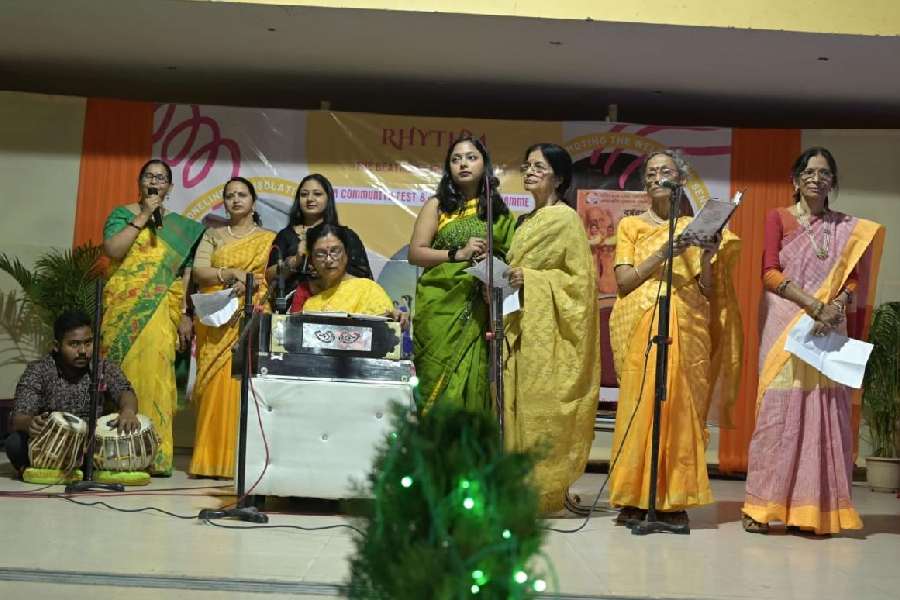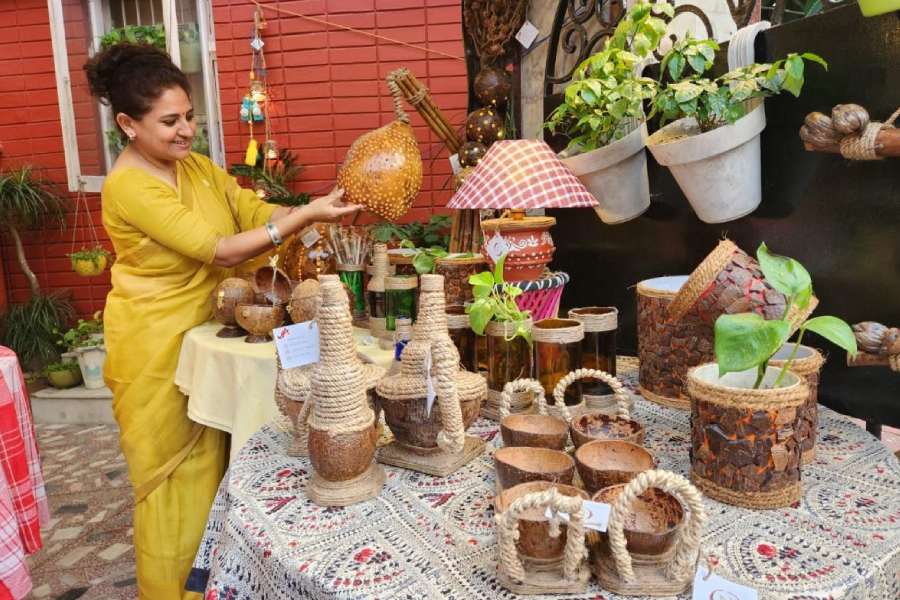A lifestyle exhibition at BE Block recently showcased how home decor as well as utility items can be made of all things upcycled.
Nuttshell Handicrafts sold stylish clothes hangers made of discarded bamboo and cane. Glass bottles had been fixed to coconut bases. The branches of guava and kanchan trees were given hooks to hang planters from.
Biddisha Basu, the lady behind the exhibition, couldn’t praise the coconut tree enough. “Every part of this tree can be upcycled. I’ve used it to make dry fruit bowls, knick knack boxes, brooms and cold-pressed oil, which is one of my best sellers,” she said. Another striking product was gourd (lau) which had been allowed to dry up on the plant over five months and then scooped out and turned into lampshades.

A musical performance at the fest in HA Block
“Post Covid, many people are in need of jobs and so I’ve tried to engage whoever I could — my domestic help’s husband and kids included — to create these,” said Biddisha. She even got the AE Market tailor to sew together old saris and make a colourful canopy atop the open-air exhibition space in her garden. Table-runners made of bits of saris were up for sale too.
“I encourage everyone to get creative and upcycle. A neighbour, who is deft with knitting, has made keychains with leftover wool for this exhibit,” Biddisha said. “Sustainable designs from waste products can save the planet.”
Biddisha counts among her projects the facade of the Zero Shop in New Town that sells upcycled waste items, as well as the bamboo canopy, tyre tools etc at Swapno Bhor senior citizen’s park. Debashis Sen, former NKDA chairman during whose tenure these had opened, had dropped by at the exhibition too.
Encouraged by the response at the fair, Biddisha is now planning to open a permanent shop at her house.
Show for all ages
When I would take my aged uncle around in a wheelchair I realised how under-prepared our city is for it. People would feel irritated at having to accommodate him and ask me why I was bringing him out of the house in the first place. Do the aged not have a right to travel and enjoy?” asked Krishna Adhikary.
She had put up a stall selling handicrafts at HA Block, where a community fest cum wellness programme was being hosted by Paritosh Sen Memorial Elderly Care Society.
The two-day event had a fair with stalls selling food, clothes, and handicrafts — such as Adhikary’s — as well as cultural shows by senior citizens and guest artistes.
The event was opened by Chandra Shekhar Ghosh, founder of Bandhan Bank.
“The youth today lack time to spend with the elders in their family and so a show dedicated to the elderly deserves credit,” said Ghosh. He also appreciated the group’s efforts to financially help the needy through a project named Suraha.
The HA Block-based society provides medical, social, and legal assistance to the elderly and its members performed music and recitation on the day. Minati Paul, 85, recited the Dwadosh jyotirlingar stotram. “The secret to my health is meditation,” smiled the HA Block resident, adding that the open-air ambiance was spreading cheer.
Some grandchildren of the Suraha beneficiaries performed tribal dance. “Our grandparents are full of interesting stories. Mine narrate ghost stories that I love to hear. It’s fun spending time with them,” said one of the dancers, Nandini Mondal. There was also a dance recital by a group led by Megh Sayantani, a transgender woman.
Among the stalls there were those selling snacks, clothes, fashion accessories etc. “Art is a hobby for me but I wanted to participate in this fair as it is in support of the elderly,” said Adhikary, who runs Krishna Karikuri. “When my father was 81, I took him to get his life certificate signed at the bank and the official there looked him up and down and remarked: ‘Apni ekhono bneche achhen!’ It upset my father so much. Our society can be so insensitive.”
Sharmishtha Sen Das, secretary of the group, said that instead of holding the event within the four walls of an auditorium, they wanted to hold it in the open. “We added a rural touch by inviting artisans to make and sell patachitra and dokra items too,” she said. “But sustaining our Suraha project is difficult as funds are drying up post-pandemic. We appeal to residents to come forward and help out.”
